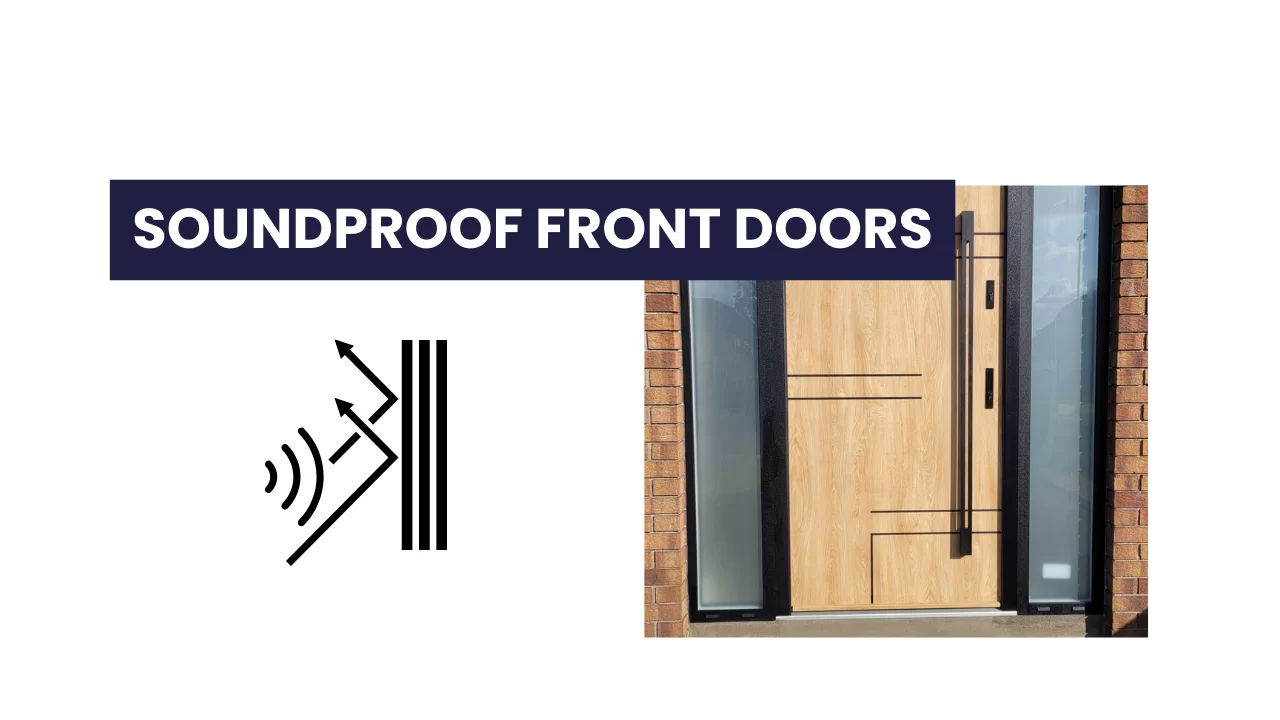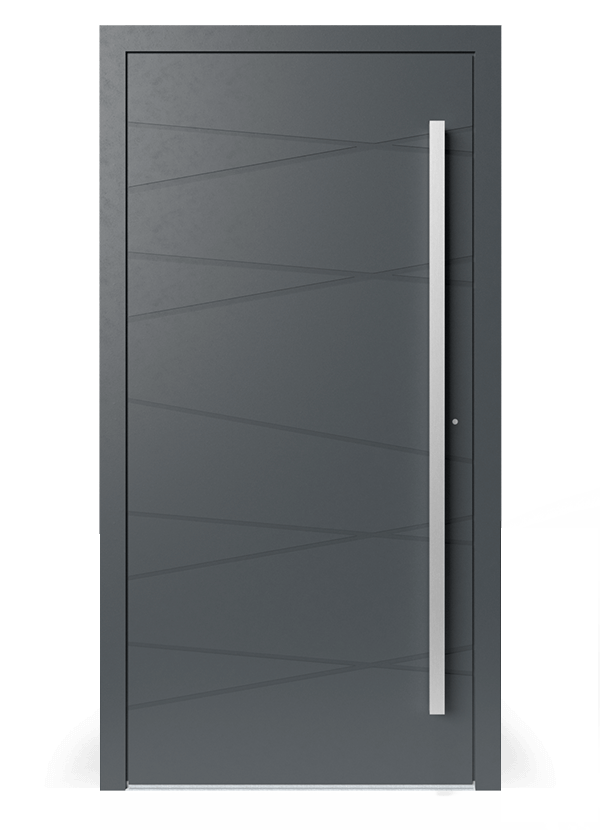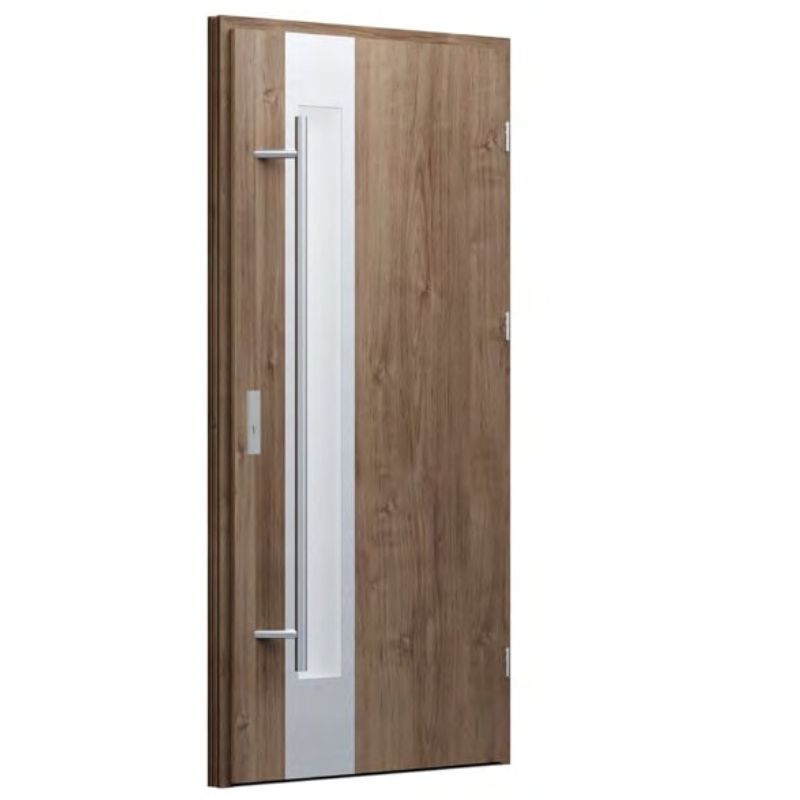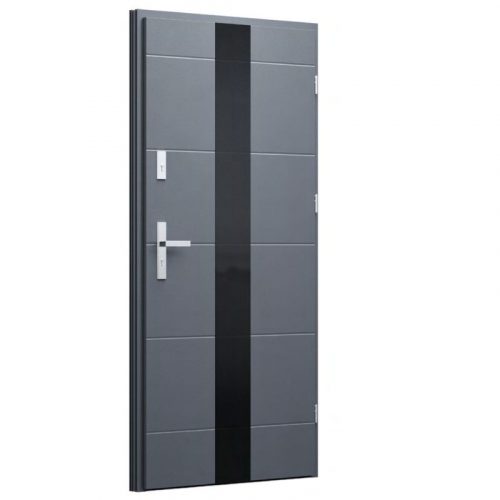Living in a city, on a busy street or in the vicinity of other noise sources can be extremely disruptive. The sounds of traffic, honking cars or noises coming from a neighbouring property can have a negative impact on your well-being and quality of life. This is why more and more people, when choosing an entrance door for their home, pay attention to whether it provides protection against external noise. Acoustic doors have such properties. Find out what they are and what advantages they have !
What are soundproof doors?
Soundproof doors, otherwise known as acoustic doors, are a special type of joinery. It is designed to reduce the transmission of sound from outside into the room or vice versa.
Today, this type of door feature is available in a wide range of products. At present, a broad range of such door joinery is available. Soundproof door models vary e.g. in their sound insulation class. With the great variety of products, it is much easier to choose the right option according to the ambient noise level and individual needs. Sound insulated doors are also designed for different types of buildings: residential, office, commercial and industrial. We have to emphasise that in addition to reducing external noise, they have the effect of improving thermal insulation, which can contribute to energy savings. In this way, choosing an acoustic door can significantly improve living comfort and also reduce your heating bills.
Aluminium Doors 35DP
What do soundproof front doors consist of?
The soundproof ness of soundproof front doors comes from their design. Major contributors to the parameter include the glazing unit and soundproofing film. Glazed doors are constructed with special acoustic glass panes. Their number largely impacts the sound damping level, which is why good soundproof glazing units are usually triple-glazed. They are made of regular, tempered or laminated glass, making them extremely durable and solid.
In addition to sealed glass units and films, soundproof doors also include the following:
- insulation layers — acoustic doors are usually made of several layers of materials with different densities. These layers absorb and dampen sound, which reduces sound transmission.
- gaskets — special gaskets are fitted around the edges of the door to help to minimise the passage of sound. Their number and positioning significantly affect the soundproofing. Soundproof front doors usually have a gasket at the perimeter and bottom edge.
- reinforced hinges — soundproof doors often have reinforced hinges and locks to keep them stable and tight. This makes them fit more snugly into the door frame and press against it.
- special materials — the materials used to manufacture acoustic doors are those with high sound dampening capabilities, such as acoustic foam, polyurethane foam and high-density materials.
Acoustic assessment parameters for doors
In fact, the most important thing about soundproof entry doors is the sound reduction index (Rw) of the partition’s sound insulation value, which helps to specify to what extent the door or window would protect against external noise. The sound reduction index is expressed in decibels (dB). The decibel is defined as a unit of sound measurement. Decibels are used to define the ability of the human ear to distinguish different levels of noise. The measure indicates the loudness of sounds. Thus, we are able to compare the noise level emitted e.g. by a spinning washing machine, tumble dryer or a honking car on the street. Humans are able to hear even the quietest sound with the sound intensity of 0 dB. Such a sound is neither a nuisance nor a health hazard though. We start feeling uncomfortable at approx. 55 dB.
Steel Composite Doors 30a
What is the sound reduction index (Rw) of acoustic doors?
The lower decibels, the better. Note: this rule does not apply to acoustic doors. For acoustic doors, the higher index (decibel value), the better sound insulation of the partition (Rw).
When determining the level of external noise the entrance door will be able to insulate, you also need to know that, in accordance with EN 14351-1, acoustic properties are indicated by the Rw value. The minimum Rw for soundproof doors is 28 decibels (the noise level of a normal quiet conversation). Still, you should consider buying a door with higher acoustic parameters, unless you live in a really quiet area. Models whose sound reduction index (Rw) is a minimum of 32 dB would be a good choice. What is their resistance to external noise?
If there is 80dB of noise outside (e.g. the honking of a sweeping horn) and you have chosen a door with a Rw of 32db, it will reduce the noise coming from outside by exactly 36dB. So in our example, it will be a reduction of 48 dB. With this calculation, we must point out that the WHO (World Health Organisation) indicates that the safe noise level for humans is 50dB.
What advantages does the soundproof door have?
Having learned what a soundproof door and its parameters are, you need to know its advantages. As we mentioned earlier, the main benefit is effective room insulation from external noise. This creates a pleasant silence in the home interior, positively influencing wellbeing and health, and increasing the comfort of living. Note also that soundproof front doors improve it not only for you, but also for your nearest neighbours. Acoustic doors also ensure that noises from your home are not transmitted to the outside and do not annoy other occupants of the property. Soundproof doors help to save on energy costs, too. This is because they retain heat in winter and coolness in summer.
All these benefits do not only make the home more comfortable, but also increase its value. Sound insulated doors are a great asset both when selling and renting out a property.
What are the benefits of having soundproof doors?
The benefits of having soundproof front doors are well known and widely discussed. However, more and more people are choosing to install soundproof internal doors. Although they are primarily used in offices, they are increasingly installed in houses, too., It is because they provide the right conditions for remote working, as well as privacy in bedrooms.
Steel Composite Doors GF02
Installation to improve acoustics
However, soundproof front doors will be of little use if the walls of the building are made of outdated technology with insufficient insulation or if the joinery is not installed correctly. Improper installation means, for example, leaving a void in the door frame. This can result in a reduction in sound insulation of up to 10dB. That is why it is so important to have the external door installed by a team of professionals, and also to select a good-quality sound absorbing glazing unit.
Which acoustic doors to choose?
When choosing acoustic doors, first of all pay attention to the acoustic rating parameter. The more decibels it indicates, the more soundproof the door is. Also consider the intended use of the door. An internal door may have a lower rating than the entrance door or sliding doors to a terrace or garden. If you’re in doubt about which model will be the perfect one for you, contact Fenbro for expert advice. Order doors and windows online from Poland to the UK and Ireland in a convenient way.




